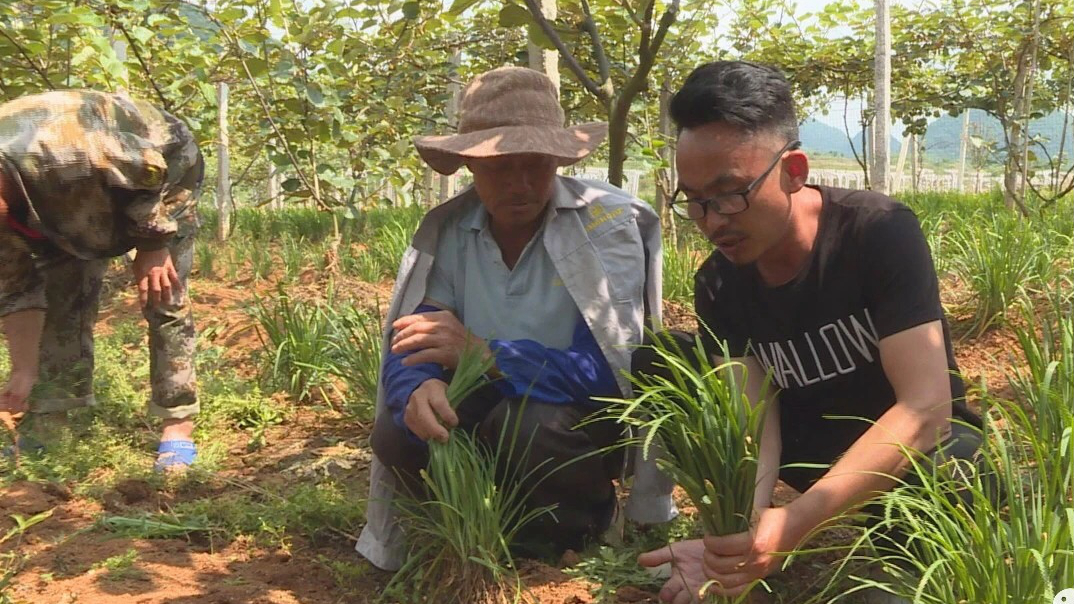In Jinhe village in southwest China's Guizhou Province, Liu Jiasong, founder of the Jinhe kiwi planting base, teaches villagers the techniques for planting kiwi.
Like many others, Liu migrated to bigger cities for work. But due to his visual impairment, the experience was bitter.
Opportunity came by chance when he heard about the economic benefits of planting kiwis while on a visit to his uncle in Xiuwen County. He didn't have the money to set up a base back then, so he decided to learn plant cultivation technology at his uncle's base first.
"I noticed that the output and price of kiwi were quite good. I was thinking to set up a base if I have enough funds," he said.
In 2016, the local authorities released preferential policies to support entrepreneurship for people with disabilities. With an investment of over four million yuan (about 570,000 U.S. dollars), Liu took initiative to start his own kiwi business in Jinhe village and lead local peers in helping them find a way to make more money as well.
"Since the beginning of learning kiwi planting, I knew that planting kiwi requires loose soil, good light, and an altitude between 1,000 to 1,500 meters. It just happens that Jinhe village has an altitude of more than 1,200 meters. In terms of climate and soil quality, it is also suitable for planting kiwi," Liu said.

Liu Jiasong (R) teaches villagers the techniques of planting kiwi. /Anshun Daily
Liu Jiasong (R) teaches villagers the techniques of planting kiwi. /Anshun Daily
According to Liu, the kiwi trees are in the fourth year of fruit bearing. He expects this year's income will see a substantial increase over last year, with output reaching more than 400,000 kilograms from the 1,300 mu (about 86.67 hectares) base, which is expected to bring income of over four million yuan.
So far, villagers who joined the base have received dividends of over 100,000 yuan.
In order to help employment for impoverished households and people with disabilities, Liu also got into the breeding business, running a poultry farm breeding about 1,300 chickens, 2,200 ducks and 800 geese.
"My poultry farm is established especially for hiring the disabled and people from poor households, because workload here is relatively light, no heavy work," Liu said.
Wang Enpei, a disable villager from a poverty-stricken family, is in charge of feeding the poultry in the farm. Having been working at the farm for over a year, Wang said the job is indispensable for his family, especially when his two kids still need to go to school.
"He pays me 2,300 yuan per month and I am satisfied with it," Wang said, adding that he cannot do a lot of work but deep down he wish he could do more for his boss.
"Although the farm can't make much money for me, it can solve the employment problem for the disabled and poor families, so I feel it is equivalent to making money," Liu said.
His own challenging migration experience sometimes crosses on Liu's mind. So when he recruits, he prioritizes candidates with disabilities. A total of 41 employees working in his kiwi base and poultry farm, among which 23 are disabled and are paid 2,000 to 5,000 yuan monthly.
The good work of helping the needy continues. Liu said he plans to distribute some of his kiwi seedlings to the disabled and impoverished families in the village for planting, hoping to help them increase more income.
"As long as they want, I will provide seedlings and planting support without charge in advance. They could pay back to the company until they generate income," Liu said, adding that he hope in this way, more people can be encouraged to get rid of poverty through their own hands and hard work.
(Cover via CFP)
Anshun Daily contributed the story.